K.A Abbas - Born: June 7, 1914, Panipat. Died: June 1, 1987, Bombay.
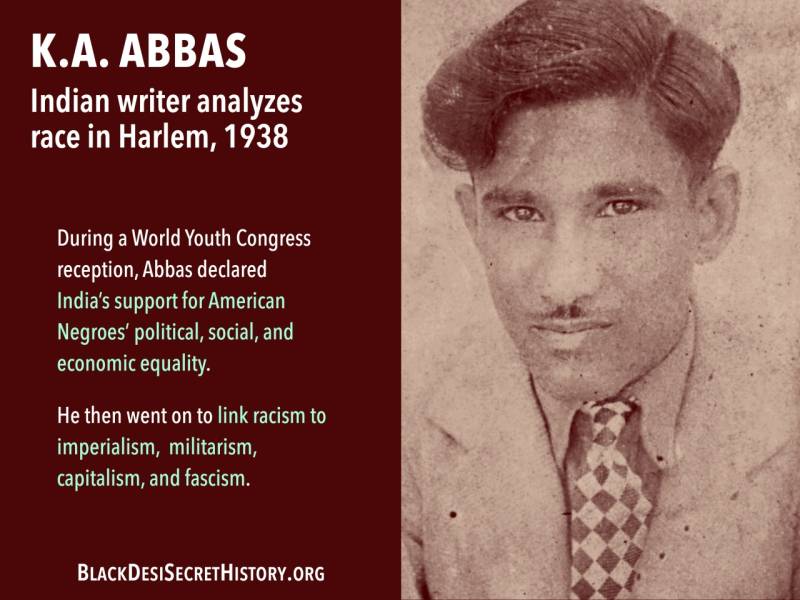
Commemorating K. A. Abbas: Ideas, ideals and more
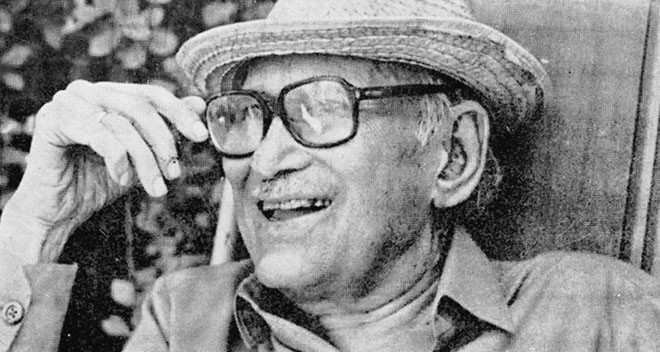
This post has the following sections:
- A Panipat connection
- A confession
- K. A. Abbas online session, 28 June 2020
- ‘Whatever I own belongs to everyone else’ – K.A. Abbas by K. A. Abbas
Panipat connection
As family, friends, and fans commemorate acclaimed writer and film producer Khwaja Ahmad Abbas in his birth (and death) month, June, Dr Syeda Hameed in Delhi adds me to their WhatsApp group. I know Syeda Apa initially through my late mentor Dr Mubashir Hasan who also mentored her. She is his niece and comrade-in-arms in our joint fight for peace between India and Pakistan, and the region (pardon the bellicose terminology).
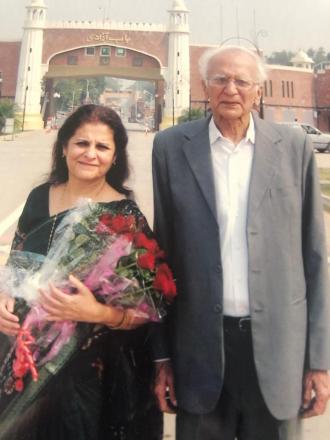
Syeda Hameed with Dr Mubashir Hassan, Wagah border, some years ago
The family hails from Panipat. Their ancestors include the celebrated Urdu poet Khwaja Altaf Hussain Hali, a student of Mirza Ghalib. K.A. Abbas’ grandfather Khwaja Gulam Abbas, a leading rebel of the 1857 War of Independence, was captured by the British, and became the first martyr of Panipat when his captors executed him from a cannon’s mouth.
In Syeda Apa’s WhatsApp group, someone posts an essay by Anwar Abbas. I have known Anwar Bhai since the early 1990s, when I carried some of his articles in the features pages I edited at The Frontier Post, Lahore. He then was then in a senior administrative position at the prestigious Habib Public School in Karachi and led several student sports expeditions to India, hockey and swimming, student exchange programmes that he wrote about and I published. I remember he had recently come to Pakistan from India and was related to K.A. Abbas. We had lost touch over the past years.
The person who posted his essay turns out to be his daughter Zeba Ali, an art teacher in Karachi. Through her I reconnect to Anwar Bhai and ask if we can use his essay in Aman Ki Asha, the website I edit. Long story short, below is the edited essay, illustrated with photos shared in the group, published in the Aman Ki Asha website.
Also sharing below, a rather lovely incident posted by Anamika Saksena, K.A. Abbas’ niece (his wife Mujji’s sister’s daughter), followed by information about the online session K. A. Abbas: Khayalaat ka Saudagar organised by Khwaja Ahmad Abbas Memorial Trust, Sunday 28 June 2020.
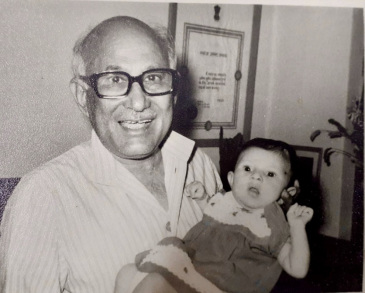
K.A.A. with nephew Anwar Abbas’ daughter Zeba, Philomena Lodge, Bombay, 1973.
A confession
As a cultural outcaste in the city of Bombay, far away from my Hindu-Muslim roots, I grew up a drifter, a rolling stone. The fact that we lived isolated from extended family and relatives, made me vulnerable to any and all influences. Not always the very best of them. My tastes in literature were average convent school. My interests in music and art were pop. The films I saw were the highly commercialized Hindi films.
With the coming of TV, I, a hopeless movie fan, got the chance to watch films more often than my mother, an educationalist, preferred. The only problem was that we didn’t have a TV. But we kids had found a way out. We would scout the colony windows looking for a very characteristic blue. This was the sign of a family gathered at the TV set. And in the times of neighborly tolerance, we were allowed to sit on the floor along with the rest of the household.
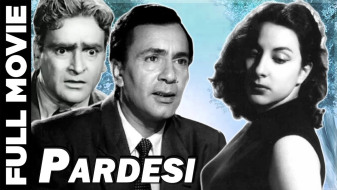
Pardesi 1957, historical Adventure movie. Starring Prithviraj Kapoor, Balraj Sahni, Nargis, Padmini, David Abraham, Iya Arepina, Vitaliy Belyakov.
One evening the movie to be shown was “Pardesi”. Now this was a very ordinary very middle class family who waited every week for their much earned masala film entertainment. The mother of the family was furious at being robbed of this privilege. I had wanted to disclose my relationship with the director of the film, but on hearing the grumblings decided against it. When the film ended, there was pin drop silence. Even we kids were quiet. The granny who usually slept through the dances and songs, was awake and pensive. The mother was brushing off a tear. I could almost hear the applauding of this small audience.
When Mama’s name came up in the film titles, I still had a chance to get some of the limelight. But realized it was too late. No one was going to believe that this barefoot kid from the neighborhood sitting on the floor, could have had anything to do with something that had so deeply touched their simple hearts.
— Anamika Saksena, post shared with the K.A. Abbas family and friends WhatsApp group
Below, Anwar Abbas’ essay:
‘Whatever I own belongs to everyone else’ – K.A. Abbas by K. A. Abbas
My mother Ahmed Fatima travelled all the way from Panipat to Bombay (now Mumbai) in the mid-1940s to receive proper medical attention in the care of a loving sister-in-law, Mujtabi Khatoon (Mujji), wife of her younger brother Khwaja Ahmad Abbas. Here in Bombay in a small flat in a building called Samandar Tarang I was born as another K.A.A. — Khwaja Ahmad Abbas named me Anwar, his favourite name and the hero of most of his films and books.
Next door lived Shahid Latif and Ismat Chughtai with their only child, Seema. Coincidentally, Seema joined Air India as a flight attendant just a few years before I joined as Assistant Station Superintendent. Along with my two sisters, my cousins and Seema, we would play on the beach with Mamoo Jaan (K.A.A.), building sandcastles that high tides from the Arabian Sea destroyed as waves lashed even the walls of our building.
Our much older cousin Captain Wasiq Hasan from Panipat, initially with the British Indian Navy and later Pakistan Navy, relates how, whenever his ship docked at Ballard Pier, he would disembark and hail a taxi for Shivaji Park, sometimes arriving at K.A. Abbas’ house well after midnight. There, he would find various men sprawled asleep on the floor under the dining table, like Balraj Sahni, Dev Anand and Prem Dhawan, all then unknown.
“Stealthily I would walk over the bodies to move towards the bedroom when Mamoo Bachhoo’s voice would softly say, ‘Mujji is sleeping inside and Sneh Lata Pradhan (a popular actor of her times) is sharing her bedroom. Don’t disturb them, lie down where you can find some space.’
The World is my Village (1983) is not just the extension of Khwaja Ahmad Abbas’ first novel Inquilab (1958) but also a philosophy of his life. It goes beyond the Indian People’s Theatre Association (IPTA) to embrace people from all over the world he met and befriended during his travels and professional work as a journalist, writer and filmmaker.
Fed up with his friends and unit members walking away with his shirts, sweaters and scarves, once many years ago, my wife and I locked up his almirah (wardrobe) of clothes. K.A.A. was livid and said, ‘Whatever I own belongs to everyone else. You are welcome to my things as well.’
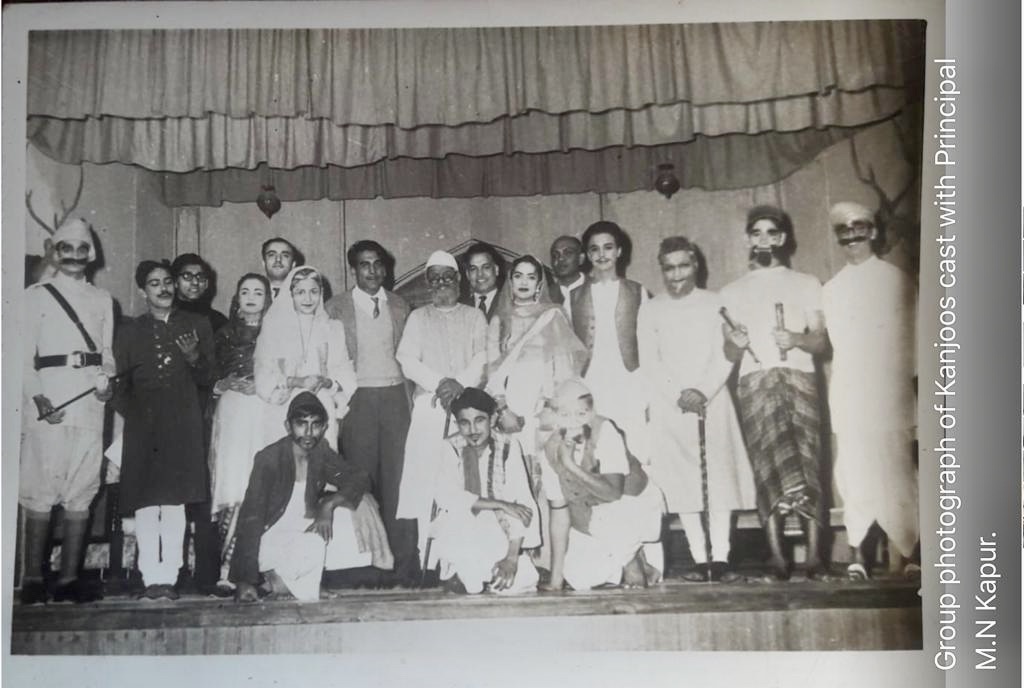
Bombay, 1960: Group photo of the cast of “Kanjoos”, Moliere’s L’Avare (The Miser) adapted in Urdu by Hazrat Awara. A Anwar Abbas (seated) played Nabboo the cheeky servant, Syeda Hameed played Farzana, the old matchmaker, directed by Ved Vyas, their revered school teacher who “gave us theatre which has been our lifeline for 60 years”, says Syeda Hameed.
When friends took off with books from his personal library, he would smile and say, “Theft of books is no theft”. Years later, wanting some of the 73 books he had authored, he wrote an appeal to friends and relatives to send the books that he would photocopy and return. But he only got back three or four.
K.A. Abbas believed in living in rented houses and had no interest in private property. In 1952, when he did his first production, Anhonee, he was living with his cousins Khwaja Ghulamus Saiyidain and Khwaja Azhar Abbas. When the doorbell rang my cousin Syeda and I would rush to the door.
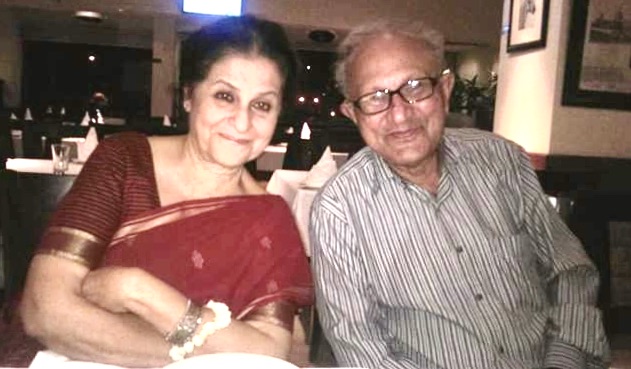
Cousins reunited: Syeda Hameed, Anwar Abbas, Karachi 2014. Photo by Nadira Abbas.
I want to meet Mr. Abbas.’
‘Which one?’ Syeda would ask mischievously.
‘I want to see Mr. K.A. Abbas.’
I would ask, ‘Which K. A. Abbas, there are two of them?’
Sometimes the visitor would turn back and leave.
While filming in Chembur, a suburb of Bombay housing many studios including R.K. (Raj Kapoor) Studios, Abbas would spend his evenings playing hockey in the Oval along with his unit members. Us youngsters would join wearing the same uniform that he provided his Naya Sansar team, his production house named after the first film for which he wrote a script, in the 1940s, the story of a journalist starring Ashok Kumar.
‘Whenever I’m close to the goal,’ K.A.A. would mourn, ‘These rascals put their little hockey sticks in front and stop me scoring a goal.’
Humble
I found his resistance to private property irksome. Once I took a loan from my company and booked a flat in the neighbouring building. He persuaded me to release the booking saying, ‘Who does my flat belong to? You, of course.’ The irony is that we occupied the two bedrooms in Philomena Apartments on what was later named Khwaja Ahmad Abbas Marg — my wife and I in one room, and my mother in the other, while the humble K.A. Abbas slept in the drawing room, often shared with some of his unit members.
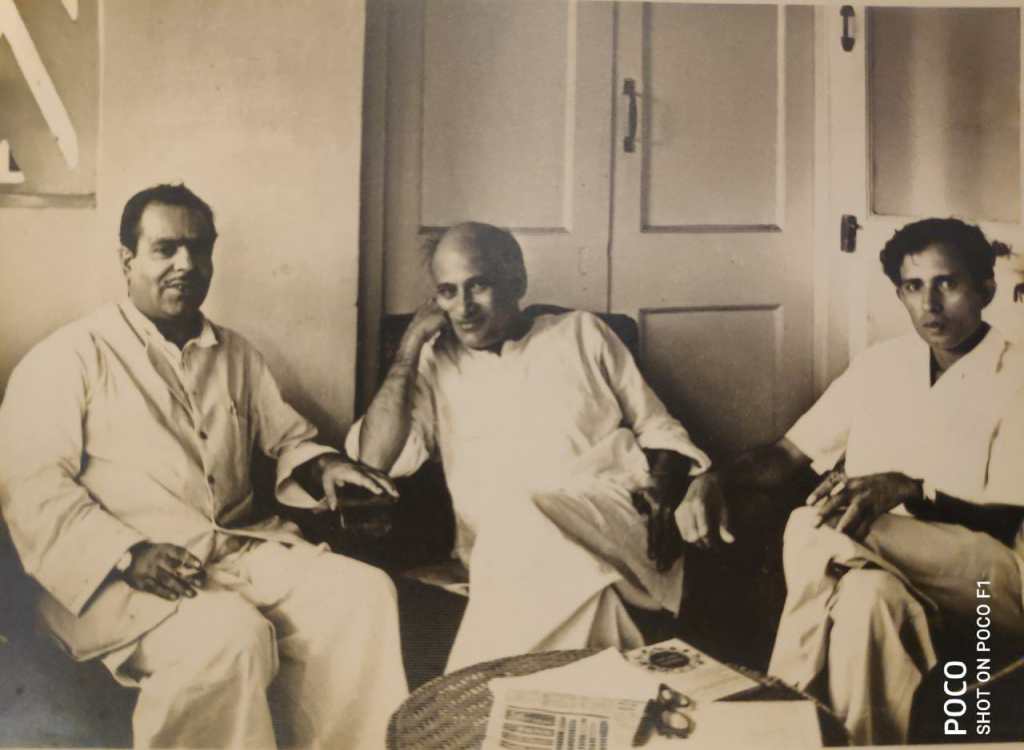
K.A. Abbas (centre) with G.M.Sadiq (L) and Munish Narain Saxena at Philomena Lodge. This balcony has featured in numerous photos and K.A.A. movies.
This is where a drunken Raj Kapoor expressed his undying love and devotion to Abbas, witnessed by a domestic servant peeping from under the table. “Log kehte hain Khawja Ajmer mein hain, mera Khwaja tau yahan hai!” he declared – People say that the Teacher is in Ajmer, but my Teacher is here!
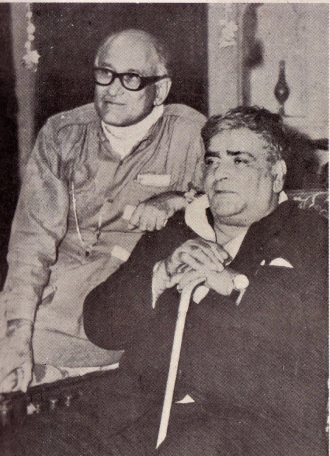
Raj Kapoor and K.A. Abbas. File photo.
The landlord with typical Catholic generosity offered K. A. A. the upper storey of one of the larger and newly-built apartments on ownership basis, if he would release the ground floor rented flat, where, ostensibly, the landlord wanted to build a commercial establishment. Abbas refused.
K. A. Abbas never had a problem traveling. He would engage in his own perfectly legal version of money laundering. His earnings on books and films sold in the then Soviet Union were blocked because the rouble was restricted currency until the early 1970s. K. A. A. would use the Russian currency to buy first class airfare tickets, and gifts for friends and family members.
The man who bought a new gas-guzzling Hudson while producing Anhonee in 1956 with Raj Kapoor and Nargis and was gifted an Ambassador car by Prithviraj for the stupendous success of Bobby, was quite comfortable using public transport. He would sit on the upper deck of a Bombay bus or precariously hold on to a bar in an overcrowded second-class compartment in the local train with equal ease.
When using a taxi he would ensure he had enough tasks in the city to justify the expense. Once while he leaving the Oberoi Hotel, he walked down a line of taxis, refusing to sit with drivers who asked where he wanted to go. He knew they take him with alacrity if he mentioned Juhu where he lived, at a distance, but refuse if he mentioned a nearby destination. He felt it was unfair to turn down short distance passengers. ‘I want to go to Juhu, but not in your taxi’, he would reply. Eventually, the driver who let him in without asking first where he wanted to go benefitted from the lamba bhada (long-distance fare).
Once, as he was waiting for a bus near his house, Dev Anand’s limousine stopped and offered him a lift. ‘No, thank you,’ he replied, ‘My bus will take me where I want to go.’
Connections
Another time he took a taxi all the way from Juhu in the north to the Blitz office in Flora Fountain in South Bombay, called by R. K. Karanjia, founder-editor and publisher of the popular weekly magazine, to write an obituary for Nehru, who was fighting for his life at Teen Murti Marg in New Delhi. Pressed by Karanjia, Abbas titled the piece, ‘Nehru Lives’.
Abbas’ younger sister Akhtar Fatima had migrated to Karachi, but he was blacklisted in Pakistan because of his writings against the two-nation theory. This did not deter him from visiting them periodically. He would buy a first-class ticket from Moscow to Bombay via Karachi with a connection that would allow him at least 48 hours on Pakistani soil. He would be taken to the airport hotel and confined to his room. He would call his well-connected friends and relatives and in the wink of an eye be at his sister’s house laughing and joking with his old friends from Aligarh.
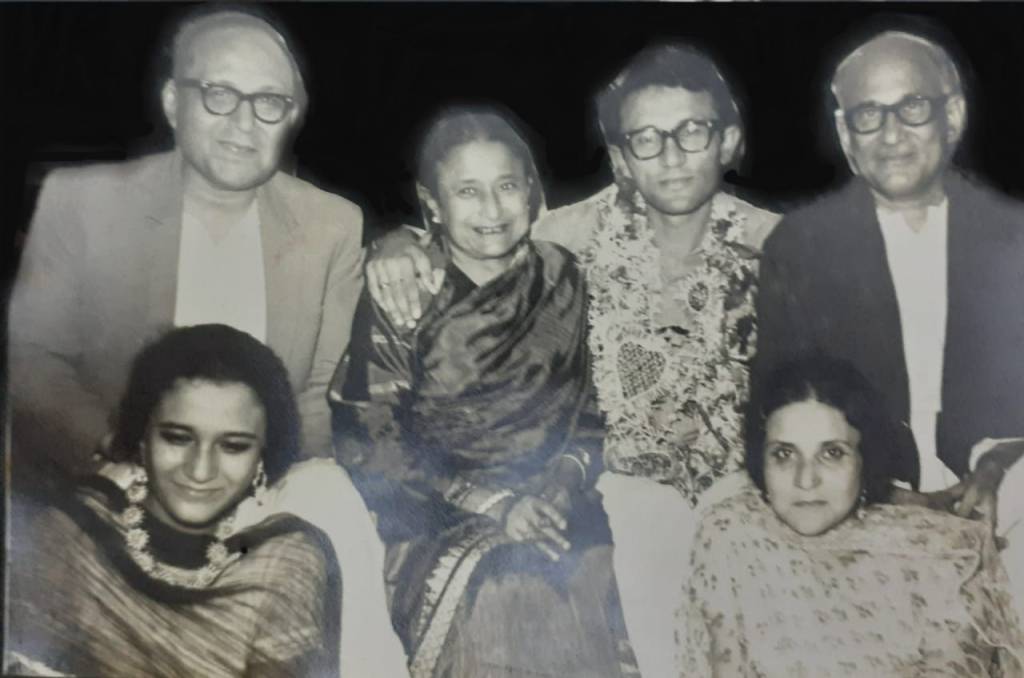
Anwar Abbas engagement. From left: Khawja Azhar Abbas, Ahmed Fatima, Anwar Abbas, K.A Abbas. Seated from left: Naheed Abbas, Nargis Abbas.
In 1970, he joined my baarat (bridegroom’s procession) that was going by train from Bombay to Karachi via Delhi and Lahore. But on reaching Delhi he learnt to his dismay that the visas of both K.A.A.s had been turned down, the senior for diplomatic and political reasons and the junior, the bridegroom, for not having an endorsement for Pakistan.
The junior went to the Pakistan High Commission and argued that he had an endorsement ‘for all countries of the world’ – and wasn’t Pakistan part of the world? The visa was granted. Not for nothing had I lived with K.A.A., modelling my life and thoughts on his patterns. K.A.A. returned to Bombay, but through the efforts of his friends T.N. Kaul and Keval Singh in the Ministry of External Affairs, he landed in Karachi a day before the nikah ceremony.
He refused to be cowed down by diplomatic postures. At a press conference in Pakistan when asked whether there was a state in India with Urdu as its first language, he replied ‘Of course, Jammu and Kashmir.‘ The next day’s headlines proclaimed ‘Abbas calls Jammu and Kashmir a part of India’, with newspaper reports claiming ‘deeper motives’ behind Abbas’ ostensible visit attending his nephew’s marriage.
Various agency walas eyed Abbas menacingly at the airport as he was leaving. As an airline employee I was in the airport with him, supported by another uncle, Khawja Masroor Hussain who was Director Intelligence Bureau.
In the mid-1970s, when I was posted in Libya, K.A.A. dropped by Tripoli on his way to Bombay. The first thing he asked was why Libya asked for the passport to be translated into Arabic. He then commented on the cowshed-like appearance of the airport terminal and the total chaos in the customer’s lounge. The translation was required because the passport was in English, I reassured him jokingly. If it were in Hindi, Libyans would have no objection.
I also pointed out the Libyan Power Minister, a suitcase in either hand, passport between his teeth, rushing from one customs officer to another to clear his baggage. He had just returned from signing the Rs 100–crore Project Misrata with the Government of India, but there was no protocol for him. On the other hand, K.A.A. had two persons to assist him: my assistant Zafar Akbar and myself. Later we saw Colonel Qaddafi driving his car, taking his son to an Indian doctor in the hospital. I also told him of the highly subsidized prices of rice, sugar and other edible oils for the benefit of the common man. So moved was K.A.A. that on his return to Bombay he devoted three of his popular ‘Last Page’ columns at the Blitz weekly to his visit to Libya and the People’s Revolution being carried out there.
Guardian angel
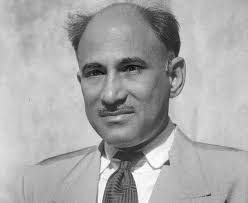
K.A. Abbas. File photo
K.A. Abbas was my guardian angel. After completing my education at Elphinstone College, Bombay, he helped me get my first job as a junior sub-editor at Blitz. It was his friend, Blitz editor R.K. Karanjia who helped me find a slot with Air India. Later at Balmer Lawrie the conglomerate of companies which I headed as chief of tourism, I managed to bag a large incoming group of American dermatologists thanks to K.A. A. The group’s condition was that the tour agents arrange a meeting for them with the President of the Red Cross Society of India. K.A.A. was in Delhi for the publication of his new book that the Vice President of India was launching. I went with him to Akbar Road when he visited the Vice President, where I requested him to host the American dermatologists. He agreed.
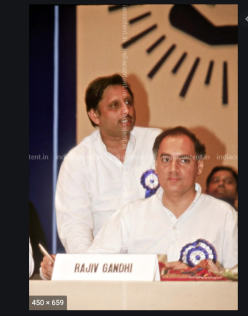 In 1985, aged 71 and already suffering from paralysis, K. A. Abbas wanted to interview the new Prime Minister Rajiv Gandhi, elected after his mother Indira Gandhi’s death. Rajiv Gandhi had Mani Shankar Aiyar by his side. K.A.A. took me along for support. The interview went off well but at the end K.A.A. asked the PM two thorny questions: Did his mother have dictatorial tendencies? And, did he think super computers are more important than milk for children? The PM who had walked up to the door to receive K.A.A. earlier, responded with stony silence.
In 1985, aged 71 and already suffering from paralysis, K. A. Abbas wanted to interview the new Prime Minister Rajiv Gandhi, elected after his mother Indira Gandhi’s death. Rajiv Gandhi had Mani Shankar Aiyar by his side. K.A.A. took me along for support. The interview went off well but at the end K.A.A. asked the PM two thorny questions: Did his mother have dictatorial tendencies? And, did he think super computers are more important than milk for children? The PM who had walked up to the door to receive K.A.A. earlier, responded with stony silence.When we left, I asked K. A. A. why he brought up those two questions.
‘To test the mettle of the young man,’ he replied.
‘But this interview could get you places, like a handsome honorarium, a chair in the media university, or an advisory post.’
‘What can anyone give me at this age except death?’ was his reply.
Once in Delhi, when K. A. A. fell ill, the doctor we called to attend to him asked, ‘What did you do before retiring?’
‘Doctor, I am in the profession where only God can retire me.’
K. A. Abbas may have wept at the demise of his beloved wife and his father, but I only saw him cry once. I was reading to him newspaper reports of Sunil Dutt’s Pad Yatra (literally, ‘pilgrimage on foot’, often undertaken. as in this case, to make a political statement) from Bombay to Amritsar, to pray at the Golden Temple and seek forgiveness for the massacre of Sikhs. Sunil Dutt walking with the aid of a stick, his head covered, evoked memories of the Salt March undertaken by the icon of India’s freedom struggle, Gandhiji. Abbas’ deep love for secularism and for Mahatma Gandhi showed in the tears that rolled down his wrinkled face.
The man who dedicated his book Till We Reach the Stars (1961) to me when I was still in college, looked forlorn as he held the railings of the balcony, gazing down as the taxi with my wife, daughter and me moved away, heading for the airport when we left for Pakistan in 1986. The following year, his younger sister and I were able to visit him while he was ailing to help make him comfortable.
K.A.A. finally “retired” on June 1, 1987, leaving behind a host of ‘family members’, whom he always cherished and belonged to as much as his close blood relatives.
(A version of the article appeared on beenasarwar.com. Anwar Abbas, a freelance writer based in Karachi, is a former airline and tour executive in India who retired as an educationist in Pakistan. This piece is edited from his essay written in 2018, shared recently on the K.A. Abbas family and friends WhatsApp group. K.A. Abbas Trust)
